Accounts |
Janet Gray,
Anniesland College. |
HNC Business, SCQF Level 7:
Business Accounting
This Unit is designed to provide candidates with an understanding of the use of accounting information within a business organisation. This is achieved in the first instance by providing candidates with the skills required to prepare basic financial and management accounting reports. In addition, the Unit will also provide candidates with the skills, knowledge and understanding to enable them to interpret and use financial information for decision making. |
Janet Gray,
Anniesland College. |
NC Level 1 Business, SCQF Level 4:
Undertaking Stock Control
This unit is designed to introduce the student to the importance of stock control within an organisation especially the recording, movement and delivery of stock.
It is part of a cluster of units being undertaken by NC Level 1 and should enable the students to operate the ‘Student Shop’ in order to raise funds for a residential trip in March 2005.
Back to top |
Business Administration |
Christine Kendrick,
Preston College.
|
OCR Administration: Level 1
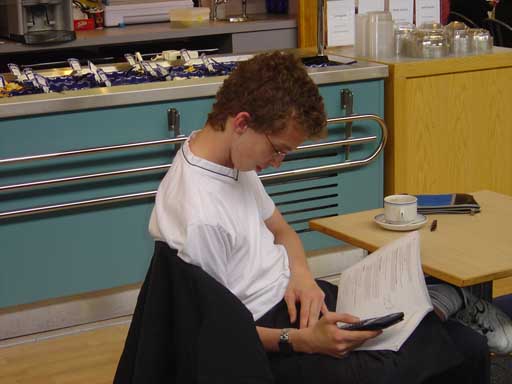 The course is aimed at students who would like to work in an administrative role in an office or who would like to progress to a Business Studies Level 2 course. It consists of five units covering business documentation, working in a team, business organisations, office procedures and information technology. Two units are assessed by external exams and three are assessed in college and then externally moderated. The course will also involve two weeks’ placement within a college department where the students could gather evidence to assist with the assessments of the college based units. The course is aimed at students who would like to work in an administrative role in an office or who would like to progress to a Business Studies Level 2 course. It consists of five units covering business documentation, working in a team, business organisations, office procedures and information technology. Two units are assessed by external exams and three are assessed in college and then externally moderated. The course will also involve two weeks’ placement within a college department where the students could gather evidence to assist with the assessments of the college based units.
|
Angela Brzeski,
Preston College. |
OCR Higher Diploma in Administrative and Secretarial Procedures: Level 4
This course is designed for people who are working in administration. Assessment is based around a portfolio of work-based evidence covering a range of evidence requirements and proving that they have the required underpinning knowledge for each unit.
Back to top |
Catering and Hospitality |
Sarah Wilcock,
Lancaster and Morecambe. |
ABC Introduction to Hospitality and Catering Skills: Level 1 qualification
ABC is the awarding body. The whole qualification aims to give all our new students the opportunity to sample all the different areas within Hospitality and Catering which include kitchen, restaurant, bar and the more theoretical elements like food costing.
The course starts in September and ends in December because the intention is that the students will complete this so they can make an informed decision on the National Vocational Qualification (NVQ) they will progress on to in January.
For the purpose of the research project we focused on two elements of the qualification which were Costing and Hospitality. The Costing unit involves the students choosing three recipes and costing the ingredients for each of these recipes. It is all based around an assignment which then goes in to their folder or portfolio which is submitted to the awarding body. The Hospitality unit is again assignment based but this time we focus on the structure of the industry and how you gain employment. |
Sarah Wilcock,
Lancaster and Morecambe. |
NVQ in Food and Drink Service: Level 2
This is assessed when the students work in the college 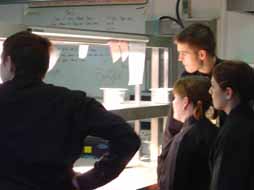 restaurant and in order to gain the qualification they need to complete several tasks consistently over a period of time. These tasks include laying up a table, serving customers meals and taking food orders. restaurant and in order to gain the qualification they need to complete several tasks consistently over a period of time. These tasks include laying up a table, serving customers meals and taking food orders.
The normal route for the student is to complete the ABC Introduction to Hospitality and Catering Skills and then move on to an NVQ Level 1 in their chosen area followed by a Level 2. Some students who have had previous experience or have shown that they have a high level of capability in the ABC qualification are usually encouraged to fast track which means they “skip” the level 1 and go straight on to level 2.
After completing the level 2 the students will either continue with their studies and go on to level 3, or leave college and go in to employment. |
Ian Gibb,
Perth College.
|
NQ Tourism and Hospitality. Food Hygiene Practices: Level 5
This unit is a 20 hr. half module which is a general practical introduction to the subject. It covers bacteriology, incidence of food-poisoning and its prevention, personal hygiene, the working environment, cleaning practices, common food pests and their control and food safety legislation.
This broad-based programme is an ideal starting point for a career in the growing leisure industry. Students will develop skills that are relevant to the travel, tourism and hospitality industries. They also benefit from visiting lecturers and site visits. |
Ian Gibb,
Perth College.
|
Gleneagles Patisserie SCQF Professional Chef Award: SCQF Level 4
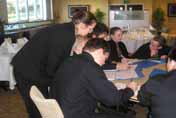 The Gleneagles Pastry training is 'added value' within the City and Guilds Certificate Professional Chef Award. There is a practical structure. The examination by Gleneagles is totally unique within a college environment. The Gleneagles Pastry training is 'added value' within the City and Guilds Certificate Professional Chef Award. There is a practical structure. The examination by Gleneagles is totally unique within a college environment.
The Professional Chef Award is a unique culinary arts experience that attracts both young and mature students and is designed for aspiring trainee chefs interested in a career within one of the fastest growing industries in the country. Skills in preparing, cooking and presenting food are developed in college, placement, visiting food/chef lecturers/restaurateurs, site visits to food suppliers, producers and the finest kitchens in the area. |
Ian Gibb,
Perth College.
|
HNC/D Hospitality: Food Hygiene Intermediate
SCQF Level 7
This unit equates to 1 credit for HNC/D Hospitality/Professional Cookery - the groups are taught together. The unit comprises of six outcomes covering bacteriology, personal hygiene, design of food premises, pests and their control, food production practices and legislation.Assessment includes multiple choice, short response answer questions, practical checklists, written project.
This programme is designed for those who would like to enter hospitality management or a promoted post within the kitchen. Skills are enhanced in our training restaurants which are open to the public. The programme also consists of added value training and certificate.
Back to top |
Childcare |
|
Rosheen Young,
Anniesland College. |
HNC Childcare and Education, SCQF Level 6
This unit enables students to acquire and demonstrate knowledge of assessment approaches in childcare and education and to recognise the role of parents and other colleagues in the assessment process. Candidates examine the nature of observational and summative assessment, the role of parents and other professionals in assessment and explain the possible uses of assessment records. The knowledge gained from this unit is put into practice in a child study as part of the unit 'How children learn and develop.' |
Rosheen Young,
Anniesland College. |
NC Childcare: Promoting Play, SCQF Level 4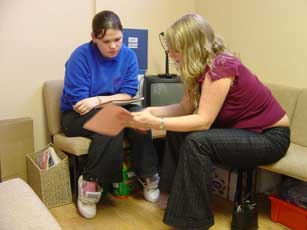 |
Christine Phillipson,
Lancaster and Morecambe. |
Level 2 CCE Certificate in Childcare and Education: Preparation for practical work with children unit
1 year course which gives students a recognised qualification with the Cache examination board (on the same level as NVQ level 2) Course content includes 5 taught units with assignments as assessment set by the examining body Completion of 2 practical placements (nursery / school) and assessment as set by the examining body A multiple choice question paper Qualifies students to work in a range of childcare settings but under supervision of a level 3 or above professional |
Christine Phillipson,
Lancaster and Morecambe. |
Level 3 DCE Diploma in Childcare and Education: Preparation for employment unit
2 year course which gives students a recognised qualification with the Cache examination board (on the same level as NVQ level 3) Course content includes 11 taught units with assignments / observations / curriculum planning as set by the examining body Completion of 3 practical placements (nanny / nursery /school) and assessment as set by the examining body Examination paper Qualifies students to work in a range of childcare setting voluntary / private sector / can hold managerial position
This unit covers aspects of professional development and prepares students for work in the professional capacity. It reflects on work covered in other taught units and makes links between theory and practical work. It assists students in applying for employment and research for employment opportunities. |
Joyce Gaechter,
Perth College |
NQ Intermediate 1 Childcare, SCQF Level 4:
Preparing for Parenthood
This unit gives students the expertise to prepare healthy snacks, choose suitable clothing for a range of purposes and organise appropriate activities.
This is a basic introductory care course which has an emphasis on childcare. It provides a broad overview of issues relating to care and parenting as well as the opportunity to go on placement in playgroups. |
Joyce Gaechter,
Perth College |
HNC Education and Childcare: Theoretical Approaches to Development and Learning , SCQF Level 7. Curriculum Approaches unit.
This unit is part of the HNC Childcare and Education course. It forms the basis for the management and organisation of the curriculum to promote the development of children in the early years. The course expands on the knowledge and skills already acquired from study of NQ Child Care and Education or SVQ Early Years Care and Education Level 2. |
Joanne Knowles,
Preston College. |
CACHE Foundation in Caring for Children (CFCC), Level 1. Play and Practical Activities Unit.
The unit is half practical and half theory and relates children's development to play. The unit forms part of a one year level 1 course for students who are interested in working in childcare. Although the qualification does not provide a license to practice, it is a good starting point for students interested in pursuing a career in care. |
Joanne Knowles,
Preston College.
|
BTEC National Diploma in Early Years, Level 3. Professional Practice Unit. 
The BTEC National Certificate is a Level 3 course, equivalent to two A Levels. The students work on 12 units over 2 years. Six units are equivalent to one A Level. The students work on their Professional Practice unit over the two years, the other units are taught within semesters. This unit links theory to practice within settings, involving doing observations of children and preparing students for working with children. The qualification provides license to practice alone in childcare settings. It also forms a recognised route onto HE courses. The Professional Practice unit focuses on providing students with the skills to complete professional observations of children in Early Years settings.
Back to top |
Construction |
Roy Anderson,
Perth College
|
Scottish Progression Award Intermediate 1. Technology Craft Practices: SVQ Level 4
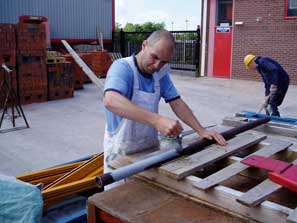 This Unit forms part of the SVQ level 2/3 Bricklaying course. It is being delivered as past of a pilot study where the emphasis has shifted from assessment based on performance criteria to 'skills' assessment. The Unit is delivered as part of a suite of Units timed to reflect, as far as possible, realistic industry requirements. This Unit forms part of the SVQ level 2/3 Bricklaying course. It is being delivered as past of a pilot study where the emphasis has shifted from assessment based on performance criteria to 'skills' assessment. The Unit is delivered as part of a suite of Units timed to reflect, as far as possible, realistic industry requirements.
|
Roy Anderson,
Perth College
|
Bricklaying. Erect Masonry Structures: SVQ L.3
This Unit forms part of the SVQ level 2/3 Bricklaying course. It is being delivered as past of a pilot study where the emphasis has shifted from assessment based on performance criteria to 'skills' assessment. The Unit is delivered as part of a suite of Units timed to reflect, as far as possible, realistic industry requirements.
Plumbing services: an introduction. SCQF L.4
This unit is an entry level course designed for students with little or no experience of plumbing practices and is part of the Scottish Progression Award Intermediate I.
The course provides students with skills and knowledge in a range of building crafts. They gain an increased understanding and insight into these crafts and improve their employment prospects within the industry.
|
Dave Brown,
Preston College.
|
Foundation Award in painting and decorating: Level 1
This is a Foundation (Level 1) course for all students entering the Construction Industry via the Painting & Decorating route. In this particular case of research, the students are adult (20+) and representative of a broad cross section of the population. Their ages range from 21 to 64 and are of both male and female gender. The students possess a range and variety of experience and both academic and practical aptitude. Many students are seeking a career change; some are starting out on a career path whilst others have retired from their previous employment and are pursuing or developing their personal interest or hobby. The mix of students’ previous knowledge and employment, facilitates and enriches the learning environment and the overall learning experience for learners. |
Dave Brown,
Preston College. |
Intermediate Award in painting and decorating : Level 2 : Level 2
This course normally takes one year to complete. It consists of 8 units. The intermediate qualification is the recognised craft qualification.
Back to top |
English |
Angela Brzeski,
Preston College |
AQA AS English Language and Literature, Level 4: Language Production Unit.
I am delivering this course at a local Islamic Boarding School for Girls. The ages of the girls vary between 6 to early twenties. The aims of the AS course is to encourage candidates to study language and literature as interconnecting disciplines in ways which deepen their understanding and enjoyment of these studies.
In this unit, the students are involved in a series of demanding literacy practices. The students are asked to compose a text for a specific purpose and audience. Examples of the texts which the student may have to write include a review (of music, plays, films, books, travel), newspaper articles; short story; biography; speech. Before writing a text, the students are expected to carefully read a springboard text/s to provide ideas of layout or content. After producing a text, the students then have to write a commentary detailing language choices made during the composition of their own text. Students are expected to comment on, for example, lexis, phonology, graphology.
Back to top |
Human Biology |
Sandra Mulligan,
Preston College. |
BTEC National Diploma in Applied Science (Forensic Science), Level 3. Workplace Practices unit.
This is a level 3 course and consists of 18 units across 2 years. The students have generally got 5 GCSEs at grade C or above and most intend to progress to higher education. The other units on the course are science based and cover aspects of biology, chemistry and physics as well as psychology and photography. The aim of the course is to give students a broad based education in the sciences to equip them for progression to science degrees or careers.
Students are assessed on a continuous basis and one of the selling points is that there are no exams! There is, however, a heavy workload throughout the 2 years with approximately 40 assignments in a year.
The unit I am looking at is part of an Integrated Vocational Assessment (IVA) which is set by the exam board, Edexcel. Students are expected to investigate a work place that uses science and compare it to similar work places. |
Sandra Mulligan,
Preston College.
|
A Level Human Biology, Level 3: Genetics, Homeostasis and Ageing unit.
This unit comes at the end of the second year of the course and includes a synoptic element which requires students to assimilate material from the first year and build on it.
Back to top |
Multimedia |
Mike Ward,
Anniesland College. |
SCQF Level 7: HNC Graded Unit
This project-based Graded Unit is in the form of a Practical Assignment. Students work in groups to produce learning materials for the NNC MM course. They can be in a format suitable for a web site or on CD. Students are assessed individually and as part of a group.
The course is designed to equip students with knowledge and skills in creative multimedia to a level where both asset creation (in text, design, digital sound, video) and integration can be carried out. These skills will have application in the workplace and in Higher Education courses. |
Mike Ward,
Anniesland College. |
HNC Introducing the Internet, SCQF Level 7
This unit is the first in a series of HN units on the internet. Students are required to access the internet at various times within the unit for: browsing, searching, file upload and download using FTP, news groups, chat facilities, forums, and sending and receiving emails. Students are required to describe the purpose and usage of each service within personal, professional and commercial fields. This unit contributes towards SQA Higher National Certificates, Higher National Diplomas and Professional development Awards. Other units that relate to the internet are Publishing on the Internet and Supporting the Internet and students can progress to these additional units. |
Mike Ward,
Anniesland College. |
Multimedia Technology (Higher), SCQF Level 6
This Unit is designed to develop knowledge and understanding of the principles of multimedia technology and to develop practical skills in the capture, creation and storage of multimedia data through the use of contemporary hardware and software. This knowledge and understanding and these practical skills may then be applied by the candidate to solve practical problems in the context of multimedia applications. It is designed for candidates undertaking the Higher Computing Course, but is also suitable for anyone wishing to extend and deepen their experience of multimedia technology beyond Intermediate 2 level, or those who have practical experience in multimedia applications wishing to develop a secure understanding of the underlying technology.
Part of Computing Higher course. This unit has been taught for the first year, to bring a more “practical” element to the computing course.
Back to top |
Music and Audio |
Ronnie Goodman,
Perth College |
HN Creative Industries infrastructure, SCQF Level 7
This unit is a Core within the new SQA Music and Sound Engineering framework at HN. It encompasses the structuring, funding and characteristics of the creative industries as well as the trade bodies and industry conventions. Networking is also covered and its essential benefits towards building a career in this industry. |
Ronnie Goodman,
Perth College |
Live Sound In-house Production, SCQF Level 5
The NQ module ‘Live Sound In-house Production 1’ is one of the core introductions to working practice for students learning basic microphone set up, sound mixing and amplification.
This involves learning underpinning theory and schematics of basic sound set ups and routing of signals through mixers, co-operating with clients to ascertain their production requirements and staging a small scale live event.
They also produce a ‘show tape’ for clients to play as an intro, ending and fallback (in break down moments!) to enhance their ‘gig’.
In-house Sound Production fits into the overall course design as a vital progression towards building skills and knowledge used in studio & live sound situations. |
Ronnie Goodman,
Perth College
|
HN Composition and Arranging, SCQF Level 7
HN Composition and Arranging is a Unit that is taken as a second study for all vocalists and instrumentalists.
It enhances the students abilities to write and collaborate on their original musical ideas, sometimes working in groups and at other points through lectures learning about instrumentation, chordal voicing, instrument ranges and song form.
Students produce a studio recording of one original composition and write this in an appropriate music notation style.
This unit provides an important progression for students to develop their creativity and their knowledge base regarding sound, form and texture. It enhances their instrumental skills in parallel with ensemble and individual core studies.
From September 2005 a new Unit; Composition 2nd Study will replace this as part of the Atrium group (Scottish music colleges / SQA) revision of HN Music Units. I was a member of the panel involved in consultation and writing this Unit in 2004.
Back to top |
Social Sciences |
Jim Carmichael,
Anniesland College. |
Moral Philosophy Intermediate II, SCQF Level 5
This is one of the three units required for the purposes of achieving an Intermediate II in Philosophy, although in this case it is delivered as a stand-alone course. this unit involves the study of two classic moral theories - the deontological moral stance taken by Kant and the utilitarian theories of Jeremy Bentham and John Stuart Mill. These theories are evaluated in the light of an examination of three issues: War - whether or not it is possible to have a 'just' war; Punishment - what is the purpose and aim of the punishment of 'wrongdoers'? and Euthanasia - when might it be justifiable to allow or assist citizens to terminate their own lives?
It is assessed by means of a single NAB. |
Jim Carmichael,
Anniesland College. |
NQ Higher History, Appeasement and the Road to War. SCQF Level 6
This is one of the three units that make up the Higher History course. This particular unit involves the students in looking at a variety of sources drawn from contemporary accounts, speeches and cartoons, as well as from the work of established historians in order to analyse those sources in terms of their accuracy, comprehensiveness and reliability.
Higher History involves work in three areas and the students are required to focus on one of three major periods in British History. This course is set in the Later Modern period, which includes the compulsory unit British History from 1850 to 1979, European History (focusing on the optional unit on Italian history) and the unit on the analysis of sources - Appeasement and the Road to War. |
Jim Carmichael,
Anniesland College. |
Highers Programme Higher Modern Studies: Income and Wealth, SCQF Level 6
This unit is part of a suite of three units that make up a Higher Still Higher. To achieve the award, students must pass all three internal assessments and the external exam. Students study some sociology and economics. It is an advantage to be aware of current affairs when studying this unit.
Students on full-time Highers programmes will be studying three Highers from the Higher Still provision, and there is a wide variety of Highers they might choose from - although most will be doing Higher English.
Back to top |
Travel and Tourism |
David Jarratt and Sarah Wilcock,
Lancaster and Morecambe College.
|
Working Overseas - level 3
Working Overseas- this is a short course (September to March) which trains students in all aspects of working as a holiday representative and a children's club leader. The course a wide variety of subjects such as Health & Safety, preparation for living abroad, leading children's physical activities (CSLA), key skills and of course customer care. The students must be able to stand up in front of a crowd and entertain. Recently they ran an Olympics style event for local Primary schools and put on a Christmas Cabaret. Those who want to be Kids Reps must do some voluntary hours at local schools or groups too. We work with 'My Travel' in the delivery of the course and they guarantee an interview to every student who completes the course. Usually between 80% and 100% of our students are offered full time positions by My Travel on completion of the course - they should be working in resort by late March / early April. Other students may look at childcare in the UK or go abroad by other means such as the Camp America scheme.
Assessment takes a variety of forms. Written assessment involves producing leaflets for customers, reports on various subjects, records of complaints (using the appropriate My Travel paperwork), Kids Clubs schedules & notice boards. We also observe the students perform a wide variety of practical activities from guided bus tours in the Lake District to Welcome Meetings in the classroom. We also use role plays to develop student confidence and customer care skills. |
David Jarratt and Sarah Wilcock,
Lancaster and Morecambe College. |
BND in Travel & Tourism - level 3
The BTEC National Diploma in Travel & Tourism is a two year course and is the equivalent to two A-levels. The students study 18 units in total; these include Marketing, Customer Service, Setting up a Business, Visitor Attractions, Cruising and Working as a Holiday Representative or Travel Agent. We have included a number of extra qualifications along side the main qualification these include: conflict handling, travel geography, selling skills, basic Spanish, Key Skills and First Aid. The students must also undertake work experience. We also have a wide variety of trips on this course - usually one domestic residential (London or Edinburgh), one overseas residential (a European destination such as Majorca or Paris) and numerous day trips within the North West of England. On completion of the course students tend to go to University or move onto our vocational courses such as Working Overseas or Cabin Crew. A number of students go straight into employment in related fields such as Hotel reception or something completely unrelated such as the Armed forces. More recently students have been taking a gap year or 'travelling'.
Assessment for the BTEC National Diploma is continuous and assignment based. The assignments typically consist of essays or reports but do often include role-plays and presentations too. The assessment for this qualification tends to be very thorough.
The typical age range for the Level three course is 16-17 years and for Working Overseas 1s 16-19. Both classes are typically mixed but tend to have a higher number of female students.
Back to top |

